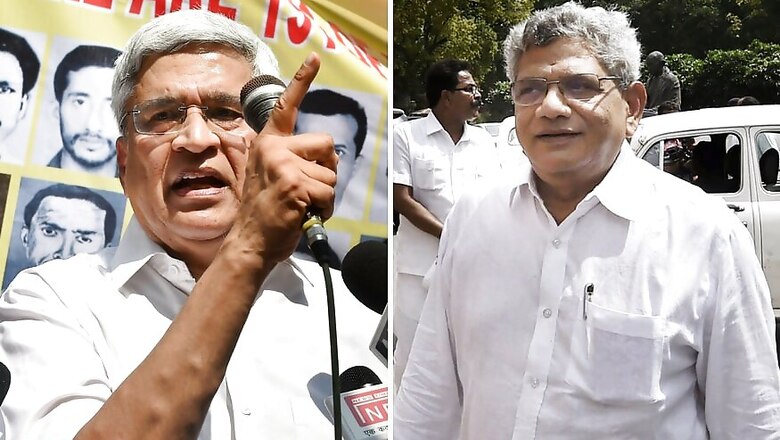
views
Ahead of its crucial 22nd Congress in Hyderabad (April 18-22), factional strife appears to have intensified in the Communist Party of India (Marxist) with a section led by former general secretary Prakash Karat and powered by the Kerala lobby, making all-out efforts to oust incumbent Sitaram Yechury and get former Tripura CM Manik Sarkar elected as general secretary instead.
But Yechury, seeking re-election, is no pushover. His supporters are also keenly monitoring the situation.
The Central Committee, comprising around 90 members, elects the new general secretary.
The five-day Congress, the top decision-making body of the CPM, will also fine-tune its future political-tactical line, apart from electing a new general secretary — the party’s top official.
Plans are also afoot to garner support and vote out Yechury’s amendment to the draft tactical-political line calling for electoral understanding with all secular forces (including the Indian National Congress) to defeat the BJP.
The Karat group had succeeded in defeating Yechury’s resolution at the recent Central Committee meeting in Kolkata. However, the party Congress could go in for course correction with hundreds of delegates expected to move amendments.
It is apparent that the party has learnt no lessons from its devastating defeat in Tripura last month when the last Marxist bastion in the country (Kerala alternates between the LDF and the UDF) was annexed by the BJP with ease.
Instead of addressing the serious existential crisis the party is facing, the party Congress is expected to see renewed factional and proxy wars between Yechury and the powerful Kerala lobby led by Karat and Chief Minister Pinarayi Vijayan.
A script is being written, which some CPM watchers believe is out of pique, to scuttle Yechury’s chances of getting a second term at the helm.
Indications to this effect have emanated from a meeting of available Politburo members in New Delhi on Monday. It appears that instead of ironing out differences over the political-tactical line, factional leaders are busy canvassing support for the next general secretary.
Sources said that at the Politburo meeting, a senior leader argued beyond the draft resolution to reaffirm the Karat camp’s stand of no understanding with the Congress and even the regional parties.
Earlier, Politburo members like Brinda Karat (70), BV Raghavulu (67) S Ramachandran Pillai (80) were in the reckoning as Yechury’s successor. While age is not on Pillai’s side, Raghavulu is a novice vis-a-vis Yechury. And in Brinda’s case, charges of nepotism may be levelled as she is the spouse of Prakash Karat. That is how the idea of projecting 69-year-old Manik Sarkar who, the Kerala faction and its supporters believe could pip Yechury, came up.
Party constitution allows a general secretary a maximum of three consecutive terms. Karat was re-elected for a third term in 2012, enabling him to helm the party for almost 10 years between 2005 and 2015.
It is intriguing as to why the Kerala faction is adamant on foiling Yechury’s bid for re-election for a second term. Among current crop of leaders, Yechury is in the mould of late Harkishan Singh Surjeet, who was proactive in stitching up broad anti-BJP coalitions in 1996 and 2004.
Some in-house critics question the choice of Manik Sarkar, who has a clean image but had failed to stop the BJP juggernaut in Tripura. Many leaders from West Bengal rue that if he had brought all anti-BJP forces, including the Congress, together the results would have been different.
In the 2013 Assembly elections, the BJP polled less than 2 percent of the vote and all of its candidates, save one, lost their deposits. In sharp contrast in March this year, the BJP vote share zoomed to over 43 percent with 35 seats, while the CPM bagged just 16 seats securing 42 percent votes. It is apparent that an anti-BJP alliance could have tilted the scale in reverse order.
Another factor for the defeat in the hill state, critics say, is Sarkar’s failure in reading the writing on the wall and connect with the youth, especially the millennials.
Joblessness was a critical issue, with Tripura topping the list of states and UTs with the highest unemployment rate in the country. Even some students affiliated with the Left had switched to the saffron camp.
Last year, the ABVP managed to secure 27 seats in the student council polls in as many as 22 government-run colleges in the state even as Sarkar remained sanguine. Can such a leader enthuse the cadre and revive the sinking fortunes of the CPM at national level?
The Central Committee and Politburo are dominated by members from Kerala and West Bengal in that order, followed by Tamil Nadu, Tripura, Andhra, Telangana and Maharashtra.
As of now, the Electoral College is evenly poised and that is why hectic canvassing is going on for the general secretary’s post. On Tuesday, Karat flew to Agartala to drum up support for Sarkar.
Sources said before his visit, CITU (CPM labour wing) president K Hemalata, a Karat camp follower, was despatched to lobby support for their candidate. Now, all eyes on the Hyderabad Congress.
(The author is a senior journalist and political commentator. Views are personal.)















Comments
0 comment